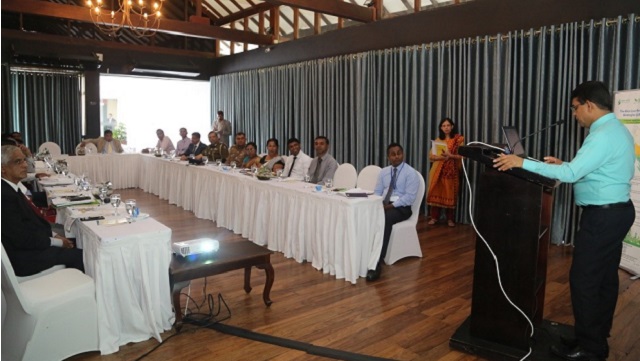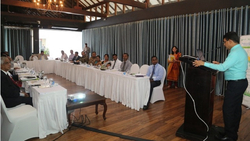ALP Meeting Discusses Electric Mobility Policy Framework for Sri Lanka

Asia LEDS Partnership (ALP) successfully organised the first consultation meeting in Colombo, to develop a framework for Sri Lanka’s Electric Mobility Policy under its ongoing SDC-funded project.
The primary aim of the meeting was to understand the ongoing and future plans of the Government of Sri Lanka to promote electric mobility in the country.
It was attended by various stakeholders, such as senior officials from the ministries of Transport and Civil Aviation, Mahaweli Development and Environment, and Megapolis and Western Development; and various line departments such as the National Transport Commission, the Department of National Planning, Sri Lanka Transport Board and the Ceylon Electricity Board, as well as the Sri Lanka Sustainable Energy Authority, Railway Board and Colombo Municipal Corporation. The Deputy Mayor of Colombo and the opposition leader from Kurunagela city also attended the meeting.
The proceedings commenced with a brief presentation by the Ministry of Transport and Civil Aviation on the past and ongoing initiatives to promote sustainable transport in Sri Lanka. This was followed by keynote addresses by the Deputy Mayor of Colombo and the opposition leader from Kurunagela.
The ALP team made a presentation and discussed the emissions scenario in the transport sector at the global, regional and country levels, and the different commitments made at national levels to control emissions in various sectors.
The team also presented and discussed the current status of mobility and electric mobility in terms of modal split and travel pattern, along with the policies pertaining to/ promoting electric mobility in Sri Lanka. The team sought the opinion of the participants on Sri Lanka’s plans regarding preferred geographies for promoting electric mobility, shift towards indigenous energy sources, provision of charging infrastructure and manufacture of vehicles, besides carrying out of research activities, provision of employment opportunities, institutional setups and funding sources, among others.
The stakeholders updated the ALP team about the studies undertaken in Sri Lanka (not in the public domain) on electric mobility, which suggested promotion of the use of electric vehicles to strengthen last-mile connectivity, and plans for phasing out conventional vehicles and for reusing batteries, among others. The stakeholders also emphasised the need for creating awareness about electric mobility in Sri Lanka and strengthening of public transport in Colombo and its surrounding areas, as building a sustainable public transport system is one of the priorities of the country.
Based on the suggestions received from various stakeholders, the ALP team plans to develop the framework for Electric Mobility in Sri Lanka and present it for further discussion in the coming months.
